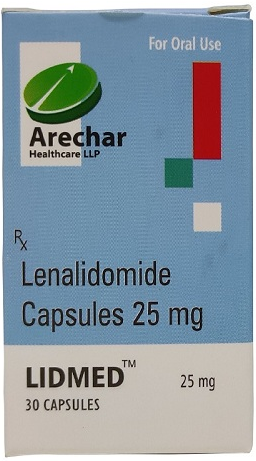What Organ is Most Affected by Multiple Myeloma

Lidmed 25 mg for Multiple Myeloma
Multiple myeloma is a kind of malignancy that develops in a certain type of white blood cells. These cells are known as plasma cells which produce antibodies that help fight illnesses. Healthy blood cells are displaced by malignant plasma cells that build up inside the bone marrow in multiple myeloma. Cancer cells produce abnormal proteins that may cause problems rather than producing helpful antibodies.
In many locations throughout the body, particularly the bone marrow, an excessive number of plasma cells may ultimately group to form a tumor or tumors. Solitary plasmacytoma is the word used when there is only one tumor. The term “multiple myeloma” is used when there are several tumors present or when there are more than 10 percent plasma cells in the bone marrow.
Cause of multiple myeloma
The multiple myeloma’s precise cause is still unknown. The unusual growth of plasma cells within the bone marrow starts a process that leads to symptoms. Scientists believe there could be many explanations, such as genetic defects, environmental issues (such as the impact of radiation exposure), and more. Myeloma risk is higher when exposed to dioxin. It can be diagnosed using blood and urine test.
Signs and Symptoms
Each patient has a unique set of multiple myeloma symptoms, beginning age, and progression pace. Some people with the condition won’t show any symptoms (asymptomatic). The progression of multiple myeloma can result in potentially fatal consequences.
- Bone pain, typically in the ribs, is the most typical symptom of multiple myeloma. Movement usually makes the pain, which can be minor, moderate, or severe, worse in sufferers.
- Affected people frequently experience repeated fractures of the affected bones and are typically more prone to breakage than the general population.
- The spinal column may be compressed as a result of the involvement of the spine’s bones, which could collapse. Pain, a lack of strength, and tingling in the legs and arms are symptoms of spinal cord compression.
- Hypercalcemia, or a high quantity of calcium in the blood, indicates that a patient may have multiple myeloma. This happens because calcium is frequently released into the bloodstream when bones are damaged.
- A range of symptoms can come from excessive plasma cell production, which can also impede the formation and reduce the function of other body cells.
- Low amounts of red blood cells in the blood (anemia) can cause symptoms like weakness, exhaustion, shortness of breath, lack of color, and dizziness.
Treatment
 Chemotherapy to lower the number of aberrant plasma cells, antibiotics to fight infection, and painkillers are typically used in the treatment of various myeloma. Lidmed 25 mg is one of these medicines. It is offered in capsule form for oral use in two dosage levels.
Chemotherapy to lower the number of aberrant plasma cells, antibiotics to fight infection, and painkillers are typically used in the treatment of various myeloma. Lidmed 25 mg is one of these medicines. It is offered in capsule form for oral use in two dosage levels.
It is made up of lenalidomide compound. This substance has antiangiogenic and immunomodulatory effects. It operates by causing white blood cells to secrete more anti-inflammatory cytokines and less pro-inflammatory cytokines.
Lidmed 25 mg(Lenalidomide capsules) are used to treat lepra reaction and multiple myeloma. This medication has an impact on immune system performance. Your body is degrading bone more quickly than it is replacing if you suffer from multiple myeloma. Bones consequently become more brittle, painful, and susceptible to shattering.
Lidmed 25 mg functions by boosting the immune system, which subtly combats cancer cells. It stops the development of new blood vessels inside the tumor. Additionally, it limits the creation of chemical messengers like cytokines and growth factors that fuel the expansion of cancer cells. Lidmed 25 mg(Lenalidomide 25 mg price) is about Rs 8234.


 Anti Cancer Drugs
Anti Cancer Drugs Hepatitis C
Hepatitis C Meds for HIV
Meds for HIV Ayurvedic Medicine
Ayurvedic Medicine Transplant Medicine
Transplant Medicine Respiratory System
Respiratory System +91-9999064250 / 9811604424 / 9811604444
+91-9999064250 / 9811604424 / 9811604444
 8(800)100-47-90
8(800)100-47-90



